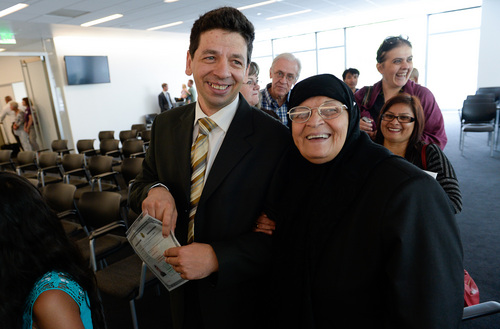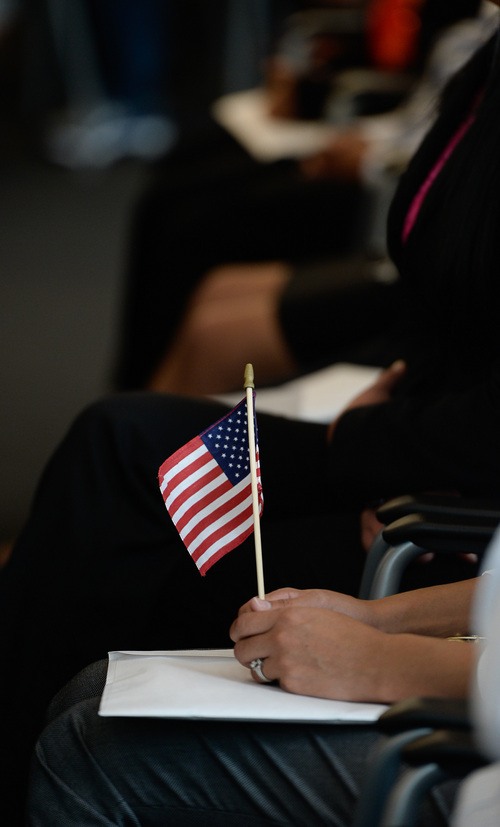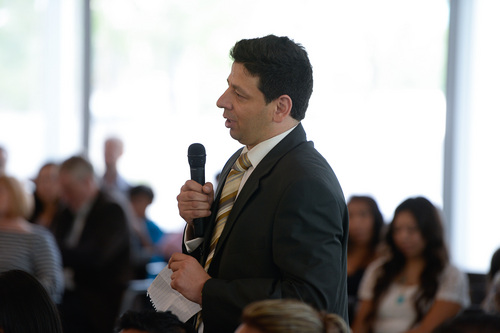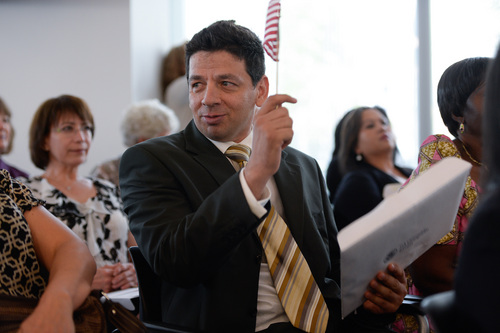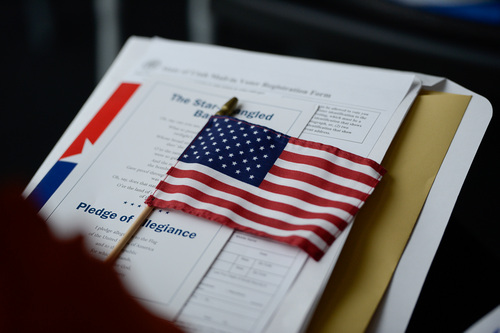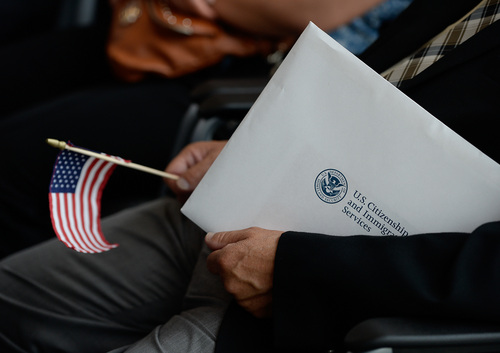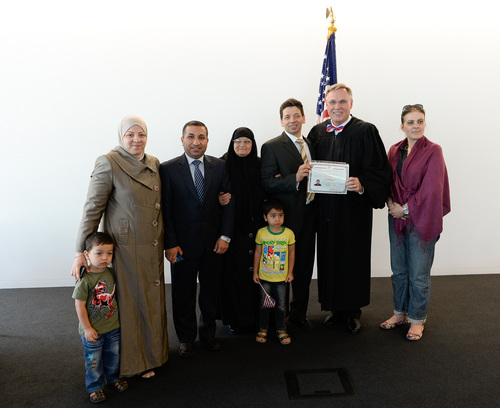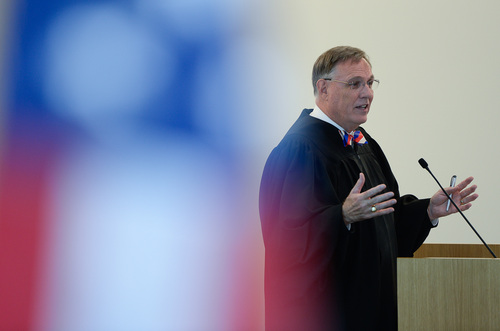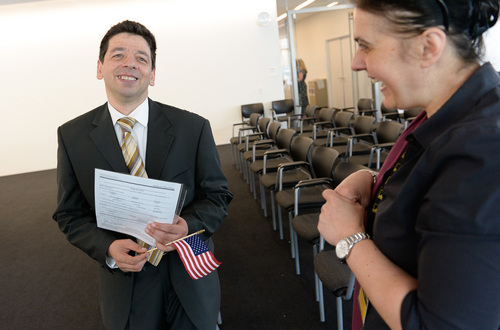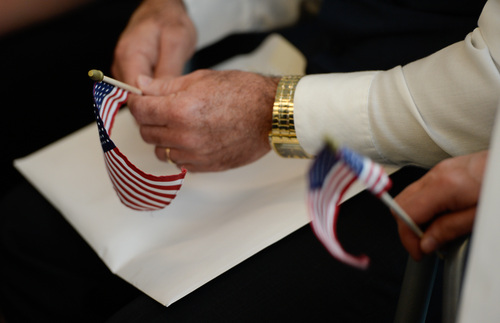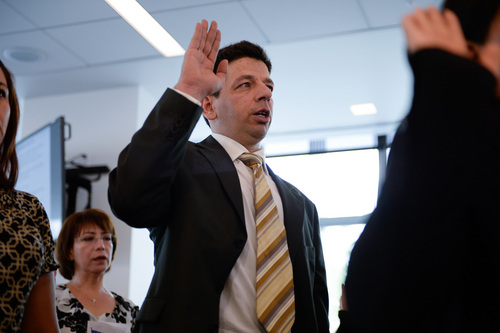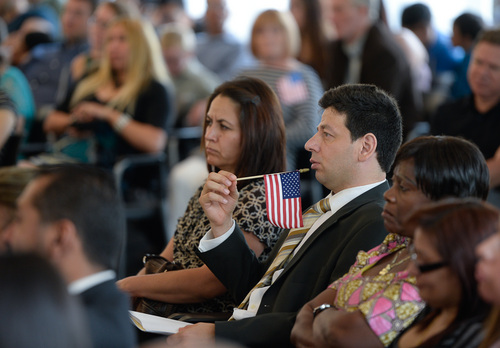This is an archived article that was published on sltrib.com in 2014, and information in the article may be outdated. It is provided only for personal research purposes and may not be reprinted.
Hussein-Jake Jawad Kadhim was called a traitor and survived three murder attempts while working as a translator for the U.S. Army in his native Iraq. The danger didn't deter him and he stuck with the job for five years.
"I feel God sent me to help the Americans and the Iraqis," said Kadhim, who is now a Salt Lake City resident — and a U.S. citizen.
The 32-year-old took the oath of citizenship along with 48 other immigrants on Friday at the federal courthouse in Salt Lake City. Many were emotional about their new status, including Kadhim, who was accompanied to the ceremony by friends and family members.
"Thank you, America, for adopting me as one of your citizens," Kadhim said. "I want to thank the U.S. Army. Those are guardian angels. They give their lives to make this country a better place. God bless America."
Kadhim grew up in Baghdad watching American movies and TV shows. His father, a mechanical engineer who had studied in the United Kingdom, would translate some of the words for him.
When his fifth-grade class started learning English, Kadhim was well ahead of his fellow students. That skill came in handy later when he needed a job, he said.
His mother, a teacher, encouraged him to work with the U.S. Army. Kadhim hesitated at first but decided his work would help his fellow Iraqis.
Not all Iraqis agreed. Kadhim — who interpreted for U.S. armed forces from 2004 to 2009 — said he ended up on a militia's black list and its members tried to kill him three times, twice by shooting at him and once by putting a stick bomb in his door. That attempt failed when the family cat pushed the door open to go outside; the pet was killed but no people were injured.
His work was appreciated by others. Kadhim said some locals were happy whenever information provided by interpreters led to the capture of militia members.
And during his stint working with the Americans, he was given several special military coins, including one from Army Gen. David Petraeus, recognizing his efforts, Kadhim said. He also received a U.S. flag from an army sergeant.
"He said, 'Keep it safe,'" Kadhim said.
So when friends warned him that militia members were searching houses and advised him to burn the flag to conceal his involvement with the Americans, Kadhim instead told his brother to bury it in the family's garden with his coins.
During the turmoil, Kadhim earned a mechanical engineering degree, the same degree his three brothers earned.
In 2009, he became one of the first Iraqis to be issued a Special Immigrant Visa (SIV), which allowed him to come to the United States. The SIV program was established by Congress to help Iraqi and Afghan interpreters whose work for the U.S. government put them in danger of retaliation.
Once in the United States, Kadhim was sent to Utah, where the International Rescue Committee (IRC) in Salt Lake City helped him settle into life in America.
Kadhim has been an interpreter for the IRC — which responds to humanitarian crises worldwide and helps people rebuild their lives — and now has a customer service job with Hertz car rental. Tanya Micic, IRC immigration coordinator in Salt Lake City, was the first Utahn he met.
Micic, who attended the citizenship ceremony, said Kadhim was one of her best clients.
"I'm very honored and proud he asked me to be here with him today," she said.
As an immigrant, Kadhim was able to bring his mother, a brother, and his sister and her family to the United States, a process that Sen. Orrin Hatch helped expedite. (His father died in 2002, and the other members of his immediate family, two brothers, are in Sweden and the Netherlands).
His mother came with the coins and flag that had been buried in the garden. She and the other family members plan to become U.S. citizens when they are eligible.
Before he arrived in the state, Kadim knew little about Utah except for the fact that the Olympics had been held in Salt Lake City and that many residents are Mormons. He had to get used to long, cold winters but has settled into his new home and is happy in Utah.
"I moved from the hell," Kadhim said, "to the heaven."
Twitter: @PamelaMansonSLC


